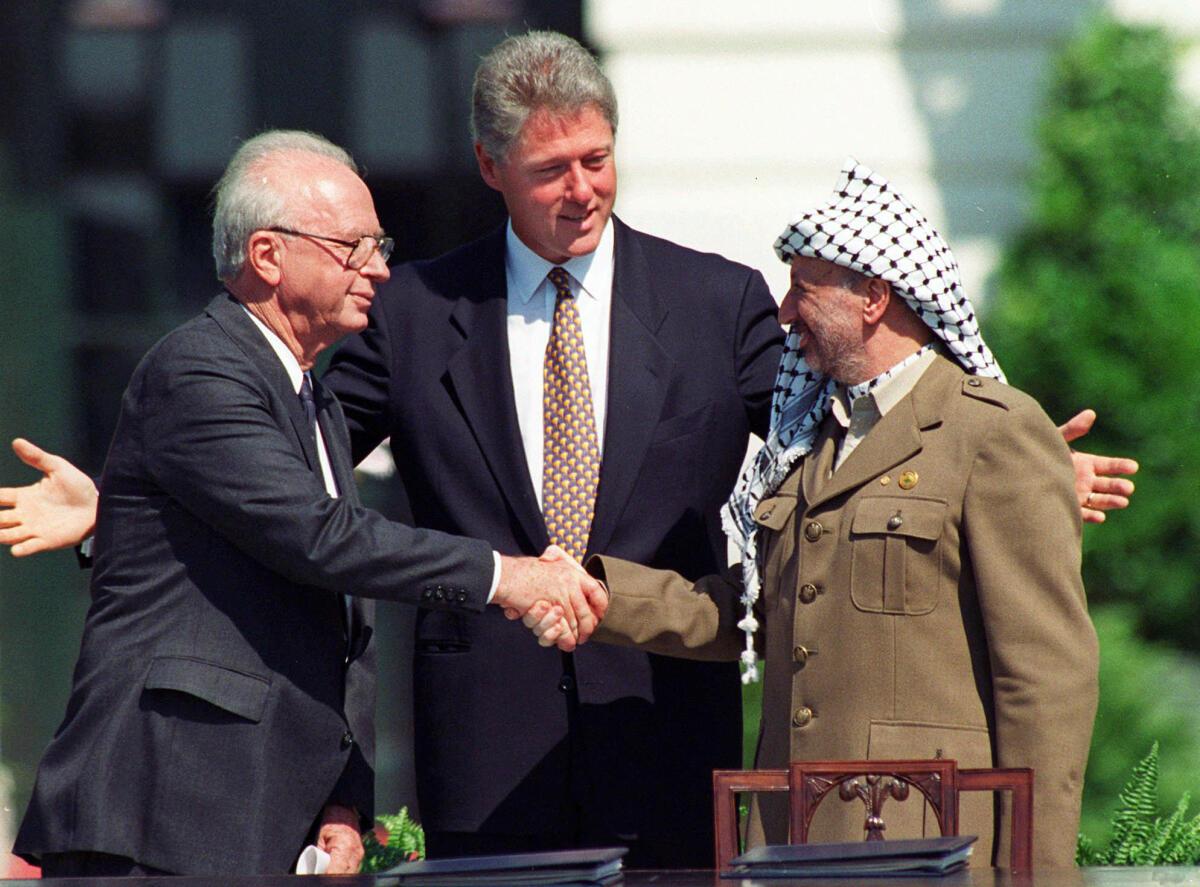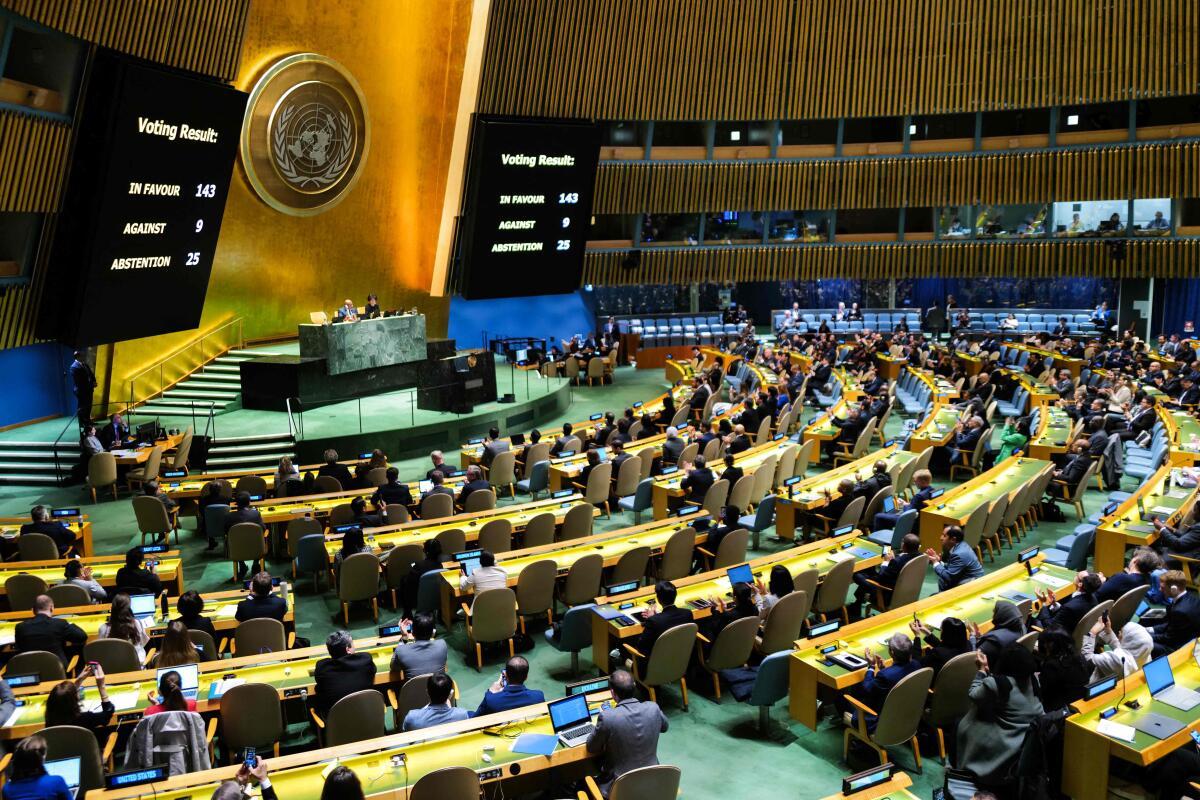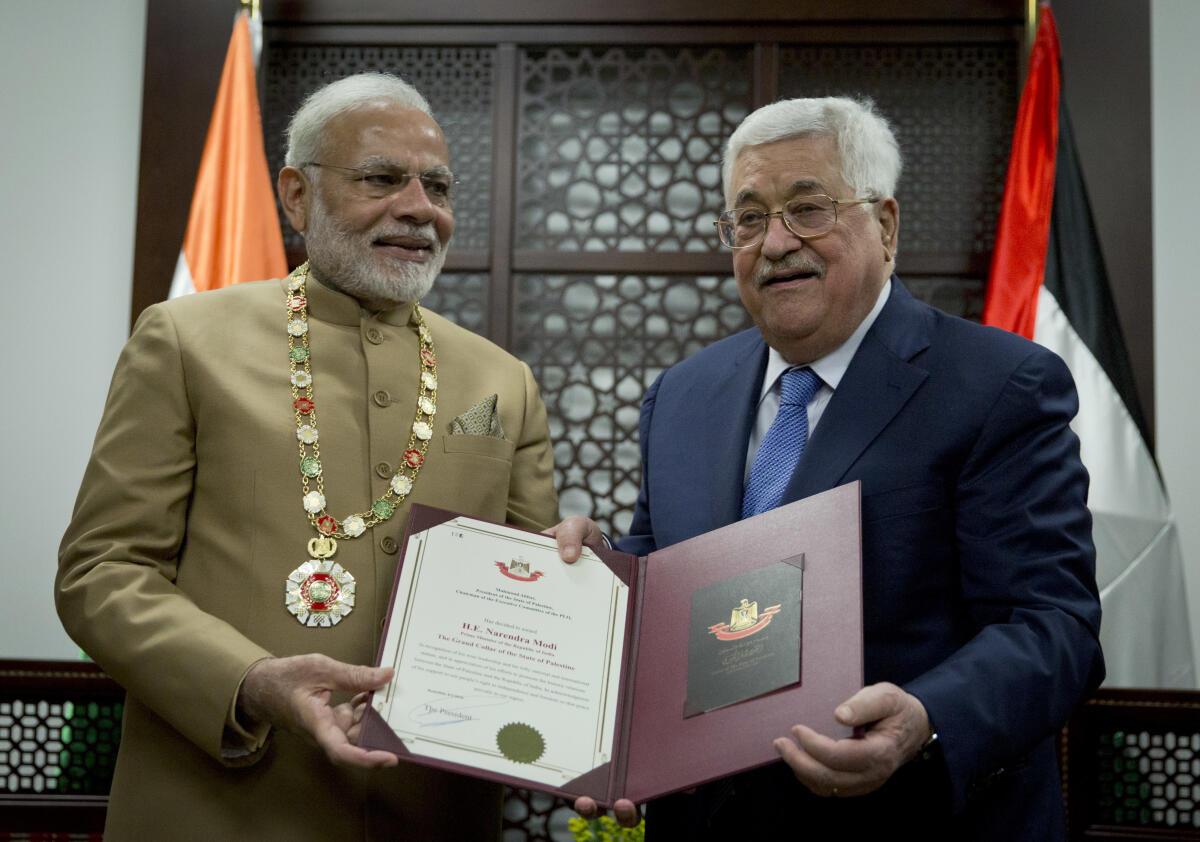The story thus far: At the same time as Israel continues to assault Southern Gaza’s Rafah, three European nations — Norway, Spain and Eire — introduced their formal recognition of Palestine as a state on Could 22. The popularity is anticipated to happen on Could 28. All three nations have urged Israel and Hamas to comply with an instantaneous ceasefire and permit support to movement uninterrupted to Gaza.
Eire’s Prime Minister Simon Harris likened Palestine’s wrestle for statehood to Eire’s battle for Independence from British rule, saying “At this time, we use the identical language to assist the popularity of Palestine as a state” at a Dublin press convention. Eire additionally recognised Israel’s proper to “exist securely and at peace” with its neighbours, advising in opposition to Tel Aviv’s incursion into Rafah and rocket assaults by Hamas and Hezbollah.
Norewegian Prime Minister Jonas Gahr Støre stated there was just one answer for Israelis and Palestinians alike: two states, dwelling facet by facet, in peace and safety. Equally, Spain’s Prime Minister Pedro Sanchez famous that recognising Palestine was a step in favour of “peace, justice and ethical consistency” and never in opposition to Israelis.
With the addition of those three nations, 146 of 193 nations on the earth now recognise Palestine as a state. Within the wake of Israel’s battle on Gaza this 12 months, Bahamas, Trinidad and Tobago, Jamaica and Barbados have recognised Palestine as a state. International locations which haven’t recognised Palestine’s statehood embrace the USA, Canada, France, Germany, Australia, Italy, United Kingdom and Japan.
Right here’s a take a look at Palestine’s quest for statehood, the nations which recognise it and India’s stance on the two-state query.
Palestine’s statehood journey
1922- 1948: British Mandate and Jewish migration to Palestine
In 1922, the British established a ‘mandate’ expressing assist for a nationwide residence for Jewish individuals in Palestine, resulting in large-scale migration of Jews from Jap Europe in direction of Palestine. The numbers swelled in Nineteen Thirties and Nineteen Forties throughout the Nazi regime and the World Struggle; the immigrant influx was opposed by the Arabs who demanded independence for Palestine. Amid continued violence, requires partition and independence, the British who had been ruling the world, roped within the United Nations (UN) to resolve the problem.
1948-1987: Israel-Palestine partition, wars and ceasefire
The UN scrapped the mandate, partitioning Palestine into two unbiased states – one Arab and one Jewish, with Jerusalem as a separate worldwide entity. In 1948, the Jewish state proclaimed its independence, calling itself Israel and capturing nearly 77% of the territory mandated as Palestine by the British, together with main areas of Jerusalem after two wars (Palestine battle and Arab-Israeli battle) with a number of neighbouring Arab nations. The remaining areas had been managed by Jordan and Egypt and run as an Arab state. Shortly thereafter, large-scale expulsion of Palestinians from Israel-controlled areas occurred, heightening tensions within the space.
Two consecutive wars occurred in 1967 and 1973 between Israel and the Arab coalition (Syria, Egypt and Jordan). Within the 1967 battle, Israel captured East Jerusalem and West Financial institution from Jordan, Gaza and Sinai from Egypt and Golan Heights from Syria. It later annexed Golan and East Jerusalem, however retuned Sinai to Egypt within the Camp David Settlement, which adopted the 1973 battle.
Within the 1974 UN Common Meeting, the physique reaffirmed the inalienable rights of the Palestinian individuals to self-determination, nationwide independence, sovereignty, and return. It additionally awarded the political coalition Palestine Liberation Group (PLO) the standing of observer within the UN Meeting. Nevertheless, tensions continued as militant wings of the PLO indulged in assaults in opposition to Israeli civilians and terror assaults on Israeli territories, resulting in Israeli offensive in opposition to Palestinians in Nineteen Eighties.
1988-2000: Palestine declares Independence
A breakthrough was achieved when PLO chairman Yasser Arafat acknowledged Israel’s proper to exist and accepted a two-state answer to the decades-long battle. On November 15, 1988, PLO adopted the Palestinian Declaration of Independence in its Nationwide Council assembly in Algiers, electing Mr. Arafat as the primary President of Palestine. Below his management, the PLO engaged in a number of negotiations with the Israeli authorities — the 1991 Madrid Convention, 1993 Oslo Accords and the 2000 Camp David Summit. These talks led to partial withdrawal of Israeli forces, recognition of PLO as Palestine’s consultant in bilateral talks, launch of prisoners and institution of a Palestine administration for self-rule in Gaza and West Financial institution. However the precise promise of the Oslo Accords, the creation of an unbiased, sovereign Palestine state, by no means materialised.

Israeli Prime Minister Yitzhak Rabin, left, and Palestinian chief Yasser Arafat shake palms marking the signing of the peace accord between Israel and the Palestinians, in Washington, Sept. 13, 1993.
| Photograph Credit score:
AP Photograph
2001-Current: Rise of Hamas, Palestine’s UN membership bid
In 2007, the militant group Hamas snatched management of Gaza, after its elected authorities was dissolved by the Palestinian Authority President Mahmoud Abbas. Israel imposed an unlawful blockade on Gaza in response, and Israel and Hamas have fought a number of wars ever since.
Tel Aviv additionally started increasing settlements within the West Financial institution whereas it withdrew all settlements from the Gaza Strip. As negotiations between Israel and Palestine broke down in 2010, Palestinian President Mahmoud Abbas utilized to the UN for Palestine’s membership to the worldwide physique in 2011. Since then, the worldwide physique is but to grant Palestine full membership. Not too long ago, the UN Meeting adopted a decision qualifying Palestine’s utility with 143 votes favouring it, 9 in opposition to and twenty-five abstaining from voting— the closest Palestine has gotten to membership.
Which nations recognise Palestine and when?
1988-89: Recognition on declaration of Independence
When Palestine first declared Independence, a number of Muslim nations, together with Saudi Arabia, Egypt, Jordan, Iran, Iraq, Egypt, Yemen, Oman, Turkey, Afghanistan, Pakistan, United Arab Emirates (UAE), Kuwait, and Qatar recognised Palestine. Equally, Asian nations like India, Laos, Indonesia, China, Russia, Mongolia, Sri Lanka, Nepal, Bangladesh, and North Korea recognised Palestine together with African nations like Algeria, Mali, Nigeria, Somalia, Libya, Chad, Sudan, Madagascar, Mozambique, Botswana, and Namibia.
A number of Jap European nations like Ukraine, Poland, Belarus, Romania, Hungary, Czech Republic, and Slovakia too recognised Palestine as soon as it declared its independence. Nevertheless, the West was extra hesitant.
Most of those nations have cited the Palestinian individuals’s proper to a state and PLO’s professional illustration of the Palestinian individuals as the explanations they’ve recognised Palestine as a state. A number of imagine that the two-state answer is the one viable possibility for long-term peace within the area, and therefore view Palestine’s recognition as a state as crucial.
Nineties-2010: Different African nations recognise Palestine
With the signing of the Oslo Accords in 1993, different African nations like Rwanda, Ethiopia, South Africa, and Malawi recognised Palestine as a state. Tajikistan, Uzbekistan, Kazakhstan, Azerbaijan, Turkmenistan, Georgia, Bosnia and Herzegovina, and the Philippines, too recognised Palestine as a state.
The 90s and early 2000s (previous to Hamas’s election victory within the Palestinian territories) was probably the most secure interval in Israel-Palestine negotiations, although Israel’s occupation and settlements continued. Mr. Arafat himself loved cordial relations with many African leaders; a number of African leaders have drawn parallels to the plight of enslaved or colonised Africans to that of Palestinians dwelling beneath Israeli rule, making the state’s recognition a pure step. Whereas nearly all African nations recognise Palestine, condemnation of Israel’s assault on Gaza has not been uniform within the continent, indicating Israel’s rising affect in Africa.
2011-Current: Latin America’s ‘pink tide’ pushes the Palestinian trigger
With Palestine making use of for membership within the United Nations, many South American nations started recognising Palestine as a state. A number of studies attribute this wave of recognition to the ‘pink tide’ — the rise of Left governments in elections. In 2010-11, Latin American nations like Brazil, Peru, Argentina, Chile, Guyana, Suriname, Ecuador, Uruguay and Paraguay recognised Palestine.
Within the late 2010s, when Left governments had been elected in Mexico, Columbia, Honduras, and Bolivia, a second wave of recognitions for Palestine flowed — with Mexico being the most recent to recognise it in 2023.
The rise of Left politics in Latin America has escalated anti-US sentiments in a few of these nations. After Tel Aviv waged battle on Gaza, the heads of Latin American states have been most vocal of their condemnation. Bolivia, Colombia, Chile, Honduras, and Argentina censured Israel’s actions, with some even severing diplomatic relations with Israel.
In line with worldwide relations knowledgeable Mauricio Jaramillo, Latin America, which has normally maintained shut relations with Israel, is sympathetic to the Palestine trigger as a consequence of its personal expertise within the Chilly Struggle. A number of army dictatorships backed by the US had been propped up in Latin America throughout the Chilly Struggle, suppressing Leftist politics.
In Western Europe, Sweden (2014) and Iceland (2011) stay the one nations which have formally recognised Palestine as a state. Some western nations have hitherto held quick to the stance that Palestinian statehood was the prize for a remaining peace settlement within the area. Nevertheless, UK International minister David Cameron has indicated that the popularity of Palestinian statehood by European nations might come earlier, to assist drive momentum in direction of a political settlement. Even France voted for Palestine’s membership to the UN within the common meeting on Could 10.

The outcomes of a vote on a decision for the UN Safety Council to rethink and assist the complete membership of Palestine into the United Nations is displayed throughout a particular session of the UN Common Meeting, at UN headquarters in New York Metropolis on Could 10, 2024.
| Photograph Credit score:
AFP
Nevertheless, the largest hurdle in direction of recognition stays the US, which vetoed Palestine’s bid for full UN membership in April. It has privately mentioned the problem with European allies however seeks readability as to what the popularity of Palestine would imply when it comes to coverage, a report within the BBC prompt.
What’s India’s stance on Palestine?
In 1947, India opposed the partition of historic Palestine on the UN. It additionally remained a powerful supporter of the Palestine trigger. It turned the primary non-Arab nation to acknowledge the PLO as a professional consultant of the Palestinian individuals. On its declaration of Independence, India recognised Palestine as a nation and opened its Consultant workplace to the Palestine Authority in Gaza in 1996, later shifted to Ramallah in 2003.
India has all the time voted in favour of UN membership for Palestine, backing the state’s newest bid in a draft U.N. Common Meeting decision. In a primary for an Indian state head, President Pranab Mukherjee visited Palestine in October 2015, whereas Prime Minister Narendra Modi adopted in February 2018. Palestine’s President Mahmoud Abbas has visited India in 2005, 2008, 2010, 2012 and 2017.

Palestinian President Mahmoud Abbas, proper decorates Indian Prime Minister Narendra Modi with the Grand Collar of the State of Palestine medal, throughout his go to to the Palestinian Authority headquarters within the West Financial institution metropolis of Ramallah, Saturday, Feb. 10, 2018.
| Photograph Credit score:
AP Photograph
Within the Israel-Palestine dispute, India has all the time supported “a negotiated two-state answer in direction of establishing a sovereign, unbiased and viable state of Palestine inside safe and recognised borders, dwelling facet by facet in peace with Israel.” Within the wake of the October 7 assault by Hamas on Israel, India condemned the assault and referred to as for de-escalation and peaceable decision of the battle via dialogue and diplomacy. Searching for the discharge of prisoners on each side, India has referred to as for an ‘rapid ceasefire’ between Hamas and Israel because the demise toll rose to alarmingly excessive ranges.



